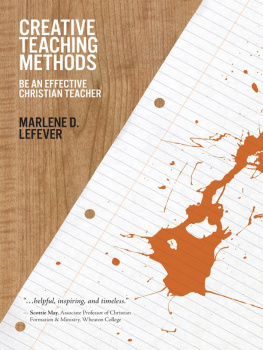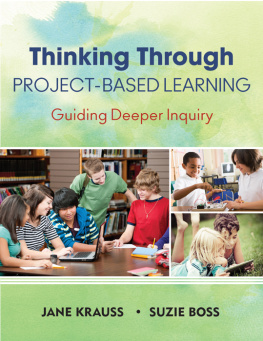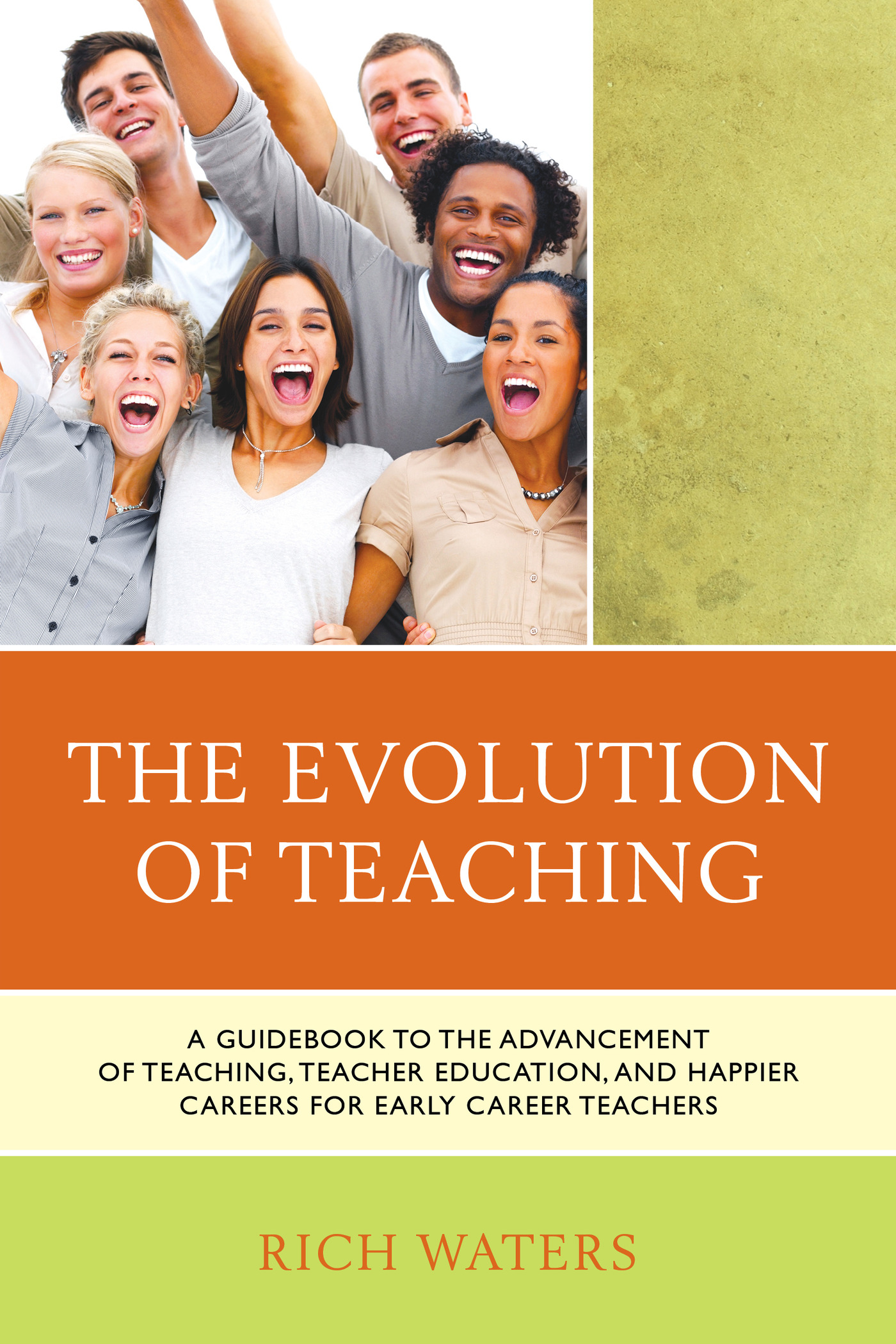The Evolution of Teaching
The Evolution of Teaching
A Guidebook to the Advancement of Teaching, Teacher Education,
and Happier Careers for Early Career Teachers
Rich Waters
ROWMAN & LITTLEFIELD
Lanham Boulder New York London
Published by Rowman & Littlefield
A wholly owned subsidiary of The Rowman & Littlefield Publishing Group, Inc.
4501 Forbes Boulevard, Suite 200, Lanham, Maryland 20706
www.rowman.com
16 Carlisle Street, London W1D 3BT, United Kingdom
Copyright 2014 by Rich Waters
All rights reserved. No part of this book may be reproduced in any form or by any electronic or mechanical means, including information storage and retrieval systems, without written permission from the publisher, except by a reviewer who may quote passages in a review.
British Library Cataloguing in Publication Information Available
Library of Congress Cataloging-in-Publication Data Available
978-1-4758-1379-1 (cloth : alk. paper)
978-1-4758-1380-7 (pbk. : alk. paper)
978-1-4758-1381-4 (electronic)
 TM The paper used in this publication meets the minimum requirements of American National Standard for Information Sciences Permanence of Paper for Printed Library Materials, ANSI/NISO Z39.48-1992.
TM The paper used in this publication meets the minimum requirements of American National Standard for Information Sciences Permanence of Paper for Printed Library Materials, ANSI/NISO Z39.48-1992.
Printed in the United States of America
Acknowledgments
Becoming able to write this book was the outcome of learning to listen. Thus, I am indebted to the fine qualitative researchers and teachers of listening who guided me. Valerie Jansick, Kathy Charmaz, and Brene Brown were primary in helping me understand how a researcher listens.
My growth as a listener led to trying to hear everything and accept feedback in all its forms. That feedback came to me primarily from students and their teachers while I was teaching and later as a researcher. Often it was the most offhanded and unrehearsed remarks from both groups that translated into important concepts and ideas. I am deeply appreciative to the students, whom I may not name, who earnestly took it upon themselves to tell this old man what was really going on in school and how they really experienced it. Likewise, I am indebted to teachers who spoke frankly with me about the sometimes unflattering realities of life as a teacher. From this sometimes risky and frank testimony emerged one overriding concept, which was at once quiet but loud: Everything about school could be so much better if only it were more personal.
Finding that message in all of my data and then translating it into this manuscript was also an outcome of learning to listen to others who inhabit schools. My hat is again tipped to Dr. Linda Crawford, who guided a sometimes difficult student in the completion of his research and dissertation. Also of special mention are two colleagues with whom I worked to develop a professional development school, Marie Toto and Pat Lasko. Apart from being an inspiration as a colleague, Marie was instrumental in helping me launch and complete the research project that provided much of the data important to this work and another one in press. She also provided important feedback on the manuscript itself. I am especially appreciative of Pat Lasko, a readers reader, who in several iterations undertook not only providing insightful feedback but also the refinement of this manuscript in each and every word. She worked on it as if it were her own.
My appreciation is also extended to Ed Dirkswager, co-author of TrustingTeacherswithSchoolSuccess:WhatHappensWhenTeachersCalltheShots, for his important research, which I see as foundational to the outlook expressed in this book. I believe his feedback on my manuscript probably had more impact than he imagines.
Finally, I extend deep appreciation to Rowman & Littlefield editor Dr. Tom Koerner, who, much to my inspiration, rejected a manuscript in a way that encouraged and invited a better one. In the process I began to see Tom not as a gatekeeper but as a fine teacher and grower of writers.
Preface
This book has a premise: The career of teaching is on hard times. Teachers are increasingly unhappy with their work. That unhappiness is not a good fit in schools. By their very nature, schools must be happy places, and the students and teachers must be happy people.
This book, then, is a response to that teacher unhappiness. Its purpose is to help early career teachers move away from their sense of powerlessness over their work and the resulting frustrations they endure in contemporary schools. It advances the idea that our traditional notion of who teachers are and what teachers do needs to change. The very concept of what it means to be a teacher needs to evolve. With the right leadershipteacher leadershipthat evolution could bring early career teachers the happy, satisfying careers they seek.
To be developed later, this book is addressed to early career teachers because as a group they have the best opportunity to advance the evolution of teaching. They can guide teaching in such a way that teachers will feel increased control over their work as they experience ongoing professional growth and the personal, human rewards all teachers want. Readers, in fact, may consider this book an attempt to sell them on change because the right change will offer early career teachers something much better than what they have now.
Readers need to know this because they will never lead change unless they believe change will lead them to something much better. Readers should consider the contrasts developed in the following table as they begin to think about change, the profession of teaching, and the quality of their future careers.
Whats in It for Teachers? Whats in It for Me?
A Career of Frustration Today | A Satisfying Career in the Future |
LackofSelf-Determination You lack a sense of control over your work. For the most part the nature and design of student work and its implementation and evaluation are dictated by legacy practices of federal, state, or local officials or publishers with whom you have little contact and who do not ask your opinion. | Self-Determination You have a sense of purpose and feel control over your work. You make important choices and play a key role in the design, execution, and evaluation of your work. |
SortiveEvaluation You feel little power over your own evaluation. You believe there are factors included that should not be there and other important factors left out. You see the process as a way of sorting teachers and not very helpful in supporting your improvement as a professional. | SupportiveEvaluation You inform how you are evaluated. You have helped design the evaluation process. You play a critical role in how the process is applied. You believe the others involved in your evaluation care about you and are supporting your growth as a professional. |
TeacherTechnician You see yourself as a worker/technician tasked with implementing standards, goals, curricula, lesson design, and even scripts dictating what you should say in delivering lessons to students. You are never asked to reflect on or give judgment about what is being taught, how it is taught, or the overall assumptions and practices of your school. |















 TM The paper used in this publication meets the minimum requirements of American National Standard for Information Sciences Permanence of Paper for Printed Library Materials, ANSI/NISO Z39.48-1992.
TM The paper used in this publication meets the minimum requirements of American National Standard for Information Sciences Permanence of Paper for Printed Library Materials, ANSI/NISO Z39.48-1992.